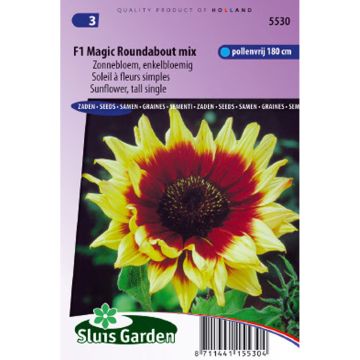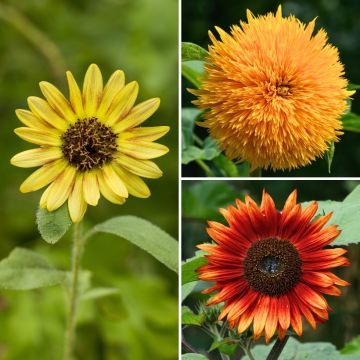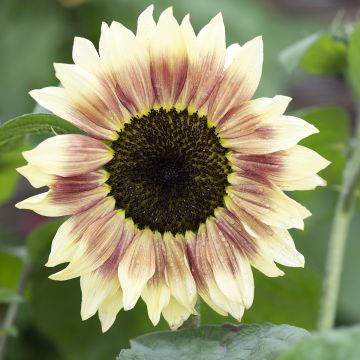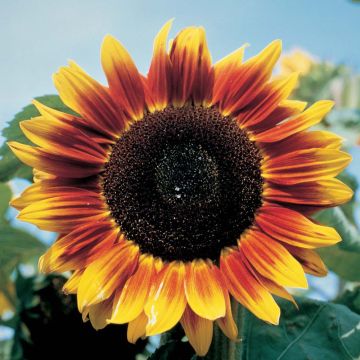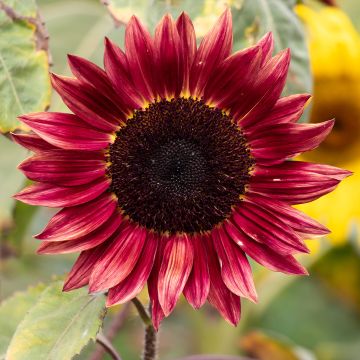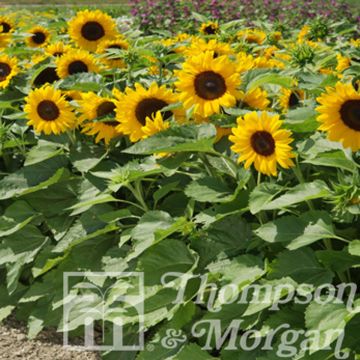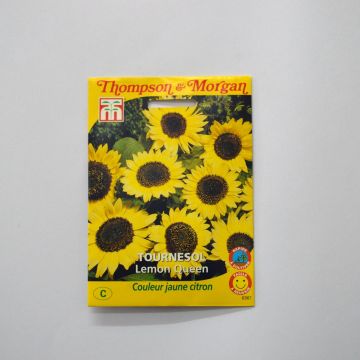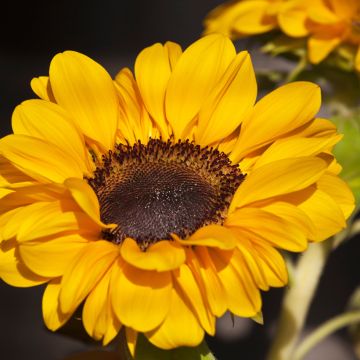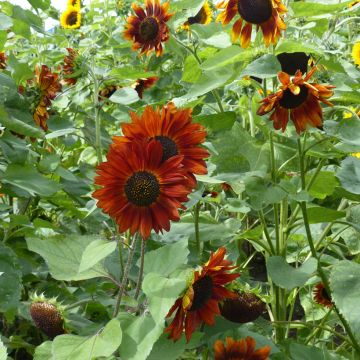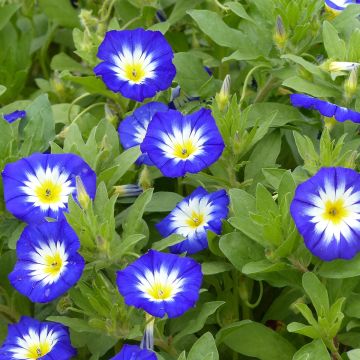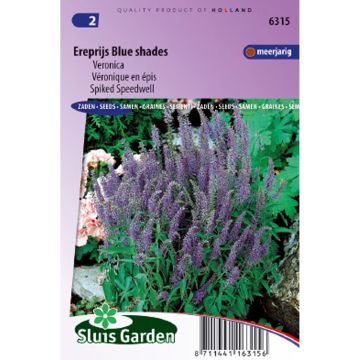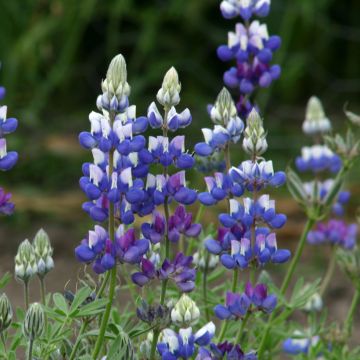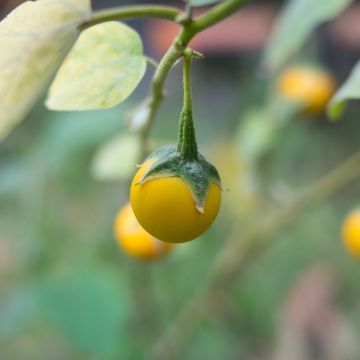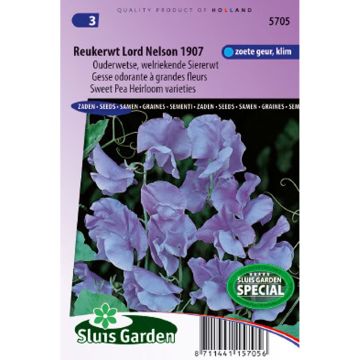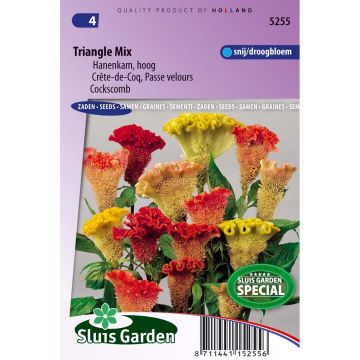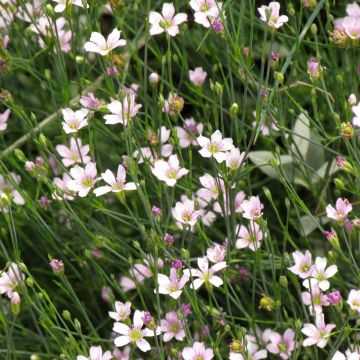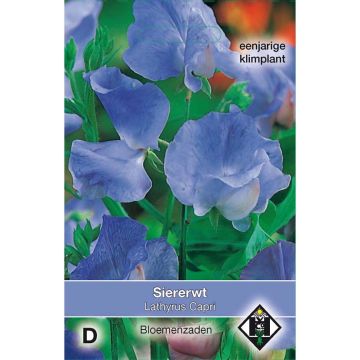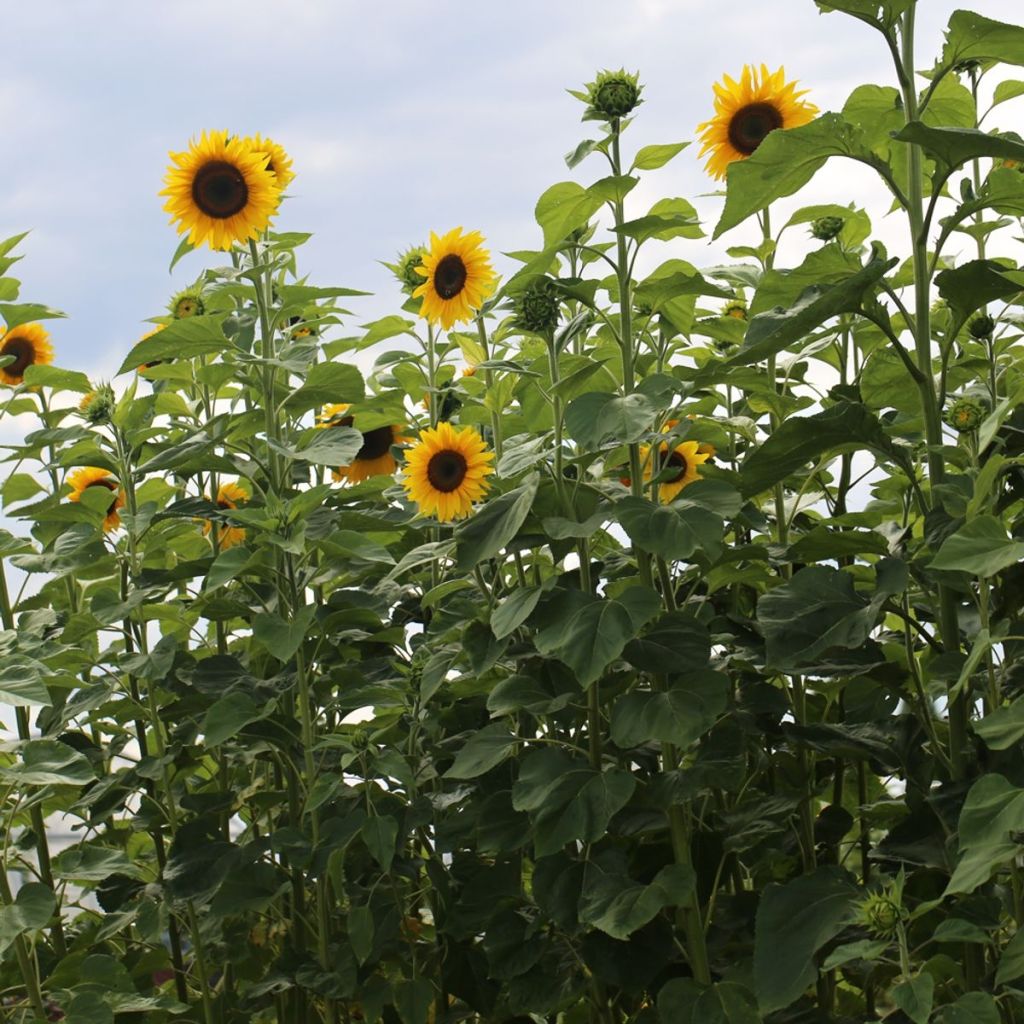

Giant BIO Sunflower Seeds - Helianthus annuus
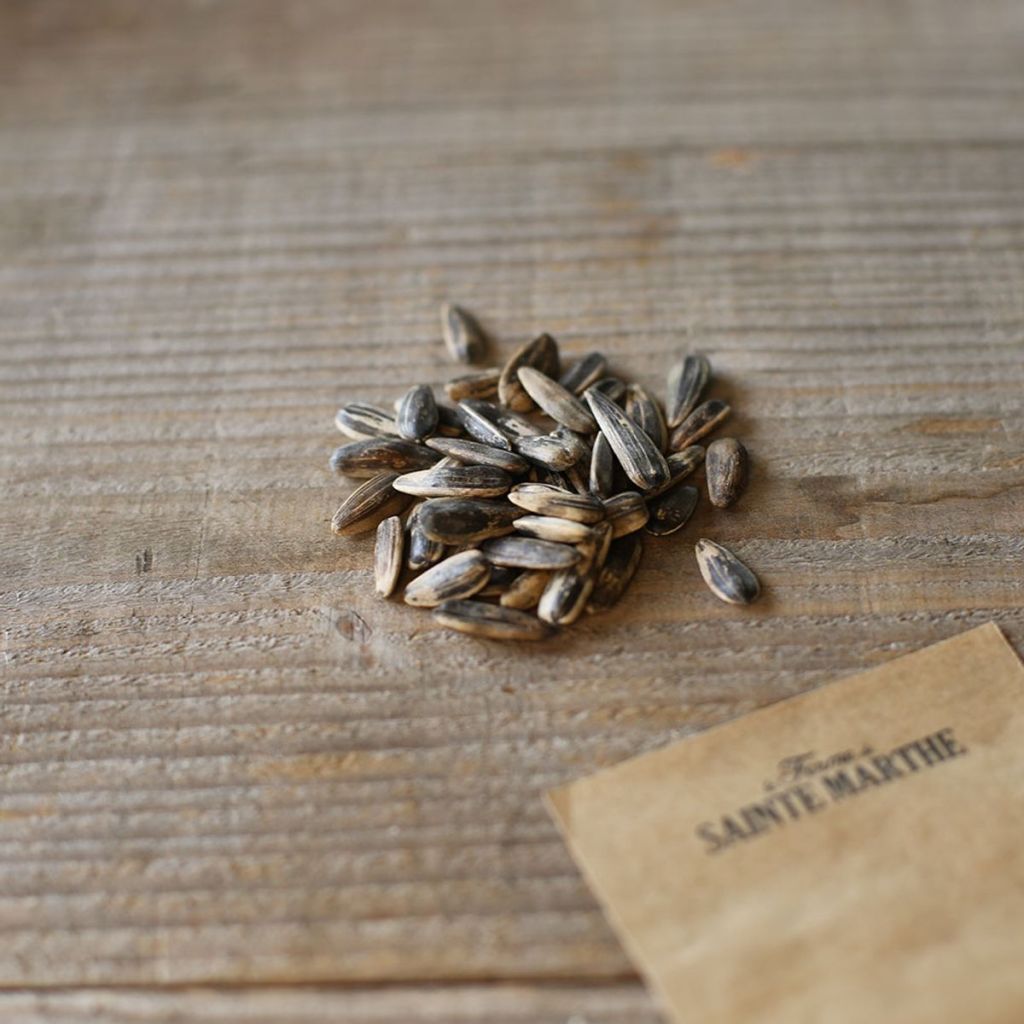

Giant BIO Sunflower Seeds - Helianthus annuus
Giant BIO Sunflower Seeds - Helianthus annuus
Helianthus annuus Géant
Sunflower
This item cannot be shipped to the selected country
Dispatch by letter from €3.90
Delivery to Corse prohibited
More information
Dispatch by letter from €3.90
Delivery to Corse prohibited
More information
Schedule delivery date,
and select date in basket
This plant carries a 6 months recovery warranty
More information
We guarantee the quality of our plants for a full growing cycle, and will replace at our expense any plant that fails to recover under normal climatic and planting conditions.
Seed-only orders are dispatched by sealed envelope. The delivery charge for seed-only orders is €3.90.
Delivery to Corse prohibited: UE law prohibits the import of this plant from mainland France to Corse as part of the fight against Xylella fastidiosa. Please accept our sincere apologies.
More information

Description
The Helianthus annuus or Giant Sunflower is an oversized and truly radiant annual plant. It develops a vertical stem that can exceed 3.50 m (11.5 ft) in height in one season. In this selection, the heads or main flowers, immense, can measure 30 to 40 cm (15.7 in) in diameter. These inflorescences are composed of a golden yellow corolla surrounding a large brown center. They attract pollinating insects, then produce a multitude of oil-rich seeds that feed birds at the end of the season. Superb in the background of a flower bed, the sunflower also finds its place in the vegetable garden or near the chicken coop. It is child's play to sow and its cultivation presents no difficulty in the sun, in rich and fresh soil.
The Helianthus annuus is none other than the famous sunflower cultivated on a large scale for the oil extracted from its seeds. This large annual plant of the Asteraceae family, domesticated for a long time by humans, has a controversial origin, but it is native to the American continent.
The spectacular flowering of this giant sunflower extends from July to September. However, we advise you to stagger your sowings to enjoy beautiful and young flowers regularly and until autumn. The flower resembles a giant daisy. It is an inflorescence in a head composed of a corolla of yellow petals or ligules surrounding a central disc where a multitude of fertile florets are packed, which will produce seeds after pollination.
Under the best conditions, it takes 12 weeks between sowing and the start of flowering. The foliage is composed of medium green leaves, single, cordate (heart-shaped), alternate, sometimes opposite at the base. They are joined to the stem by a more or less long petiole and are rough to the touch. Before flowering, the plant optimizes its growth by following the sun's course. This phenomenon called heliotropism has given rise to some of its common names: Heliotrope, Sunflower, Sunflower, Garden Sun...
Its great ease of cultivation, its large seeds that are easy to germinate are very popular with children who are introduced to the joys of gardening. The Giant Sunflower is particularly suitable for ornamental purposes in large flower beds, but also for decorating chicken coops and vegetable gardens where it will attract many beneficial animals for the gardener. It only requires sun and soil that is not too dry to flourish with simplicity. It is a vegetable plant with a rustic appearance and, as such, it will fit well in the wilder areas of the garden, in the company of artichokes, cardoons, large thistles, sainfoin, perennial peas, Jerusalem artichokes... If the weight of the flower is not suitable for making classic bouquets, it is very suitable for decorating a large jar that can be placed on the terrace.
To enjoy your Sunflower bouquets for a longer time, follow these few tips:
- Cut the flowers in the morning just after they have opened. Use a knife that has been cleaned beforehand.
- Remove the leaves starting from the bottom, leaving only 2 or 3 leaves under the flower.
- Change the water in the vase every day with fresh water.
Sunflower in the kitchen:
The buds, petals, and seeds are edible. Add a few petals to a green salad for the contrast of colors and their nutty taste. The green buds can be blanched, then sautéed in garlic butter. Their flavor is similar to that of Jerusalem artichokes. The flesh of the seed can be eaten raw or roasted.
An ecological asset:
Throughout the summer, the nectar-rich Sunflower flowers attract pollinating insects and butterflies to your garden. A good way to improve the ecosystem and promote fruit and vegetable production in your vegetable garden.
The oil-rich seeds are particularly appreciated by birds (parrots, tits, doves, goldfinches, siskins, nuthatches, finches, etc.). At the end of flowering, harvest them to make some happy during the winter scarcity.
Harvest
Plant habit
Foliage
Botanical data
Helianthus
annuus
Géant
Asteraceae
Sunflower
North America
Annual
Other Sunflower seeds
Planting and care
Sow the annual Giant Sunflower from March to May in pots. Use good quality soil that you will sift on the surface to bind the seed to its substrate. Before sowing, lightly press down the soil with a plank. Sow your seeds by broadcasting. Cover the seeds by sprinkling soil on top or vermiculite, lightly press down and water generously with a fine rain. Place your pots in light, without direct sunlight, at a temperature of 20°C to 25°C. Lower the temperature at night to 17°C to create a beneficial alternation for germination.
The seeds will take 21 days to germinate. Keep the soil moist but not excessive during growth. 15 days before their final planting, start gradually acclimating them to a temperature of 15°C.
By the end of May or early June (or earlier depending on the regions), the temperature will be warm enough in the garden to plant your young plants. Choose a sunny location. Add a good handful of compost to each planting hole. Space your plants 45 to 60 cm apart (23.6 in).
Sowings done in May can be done directly in place. By staggering your sowings, you will extend the flowering period until autumn.
Protect your seedlings from attacks by snails and slugs, which are fond of these young plants. By sowing chives near your sunflowers, you will deter aphids from settling there.
Seedlings
Care
Intended location
-
, onOrder confirmed
Reply from on Promesse de fleurs
Flower seeds
Haven't found what you were looking for?
Hardiness is the lowest winter temperature a plant can endure without suffering serious damage or even dying. However, hardiness is affected by location (a sheltered area, such as a patio), protection (winter cover) and soil type (hardiness is improved by well-drained soil).

Photo Sharing Terms & Conditions
In order to encourage gardeners to interact and share their experiences, Promesse de fleurs offers various media enabling content to be uploaded onto its Site - in particular via the ‘Photo sharing’ module.
The User agrees to refrain from:
- Posting any content that is illegal, prejudicial, insulting, racist, inciteful to hatred, revisionist, contrary to public decency, that infringes on privacy or on the privacy rights of third parties, in particular the publicity rights of persons and goods, intellectual property rights, or the right to privacy.
- Submitting content on behalf of a third party;
- Impersonate the identity of a third party and/or publish any personal information about a third party;
In general, the User undertakes to refrain from any unethical behaviour.
All Content (in particular text, comments, files, images, photos, videos, creative works, etc.), which may be subject to property or intellectual property rights, image or other private rights, shall remain the property of the User, subject to the limited rights granted by the terms of the licence granted by Promesse de fleurs as stated below. Users are at liberty to publish or not to publish such Content on the Site, notably via the ‘Photo Sharing’ facility, and accept that this Content shall be made public and freely accessible, notably on the Internet.
Users further acknowledge, undertake to have ,and guarantee that they hold all necessary rights and permissions to publish such material on the Site, in particular with regard to the legislation in force pertaining to any privacy, property, intellectual property, image, or contractual rights, or rights of any other nature. By publishing such Content on the Site, Users acknowledge accepting full liability as publishers of the Content within the meaning of the law, and grant Promesse de fleurs, free of charge, an inclusive, worldwide licence for the said Content for the entire duration of its publication, including all reproduction, representation, up/downloading, displaying, performing, transmission, and storage rights.
Users also grant permission for their name to be linked to the Content and accept that this link may not always be made available.
By engaging in posting material, Users consent to their Content becoming automatically accessible on the Internet, in particular on other sites and/or blogs and/or web pages of the Promesse de fleurs site, including in particular social pages and the Promesse de fleurs catalogue.
Users may secure the removal of entrusted content free of charge by issuing a simple request via our contact form.

































